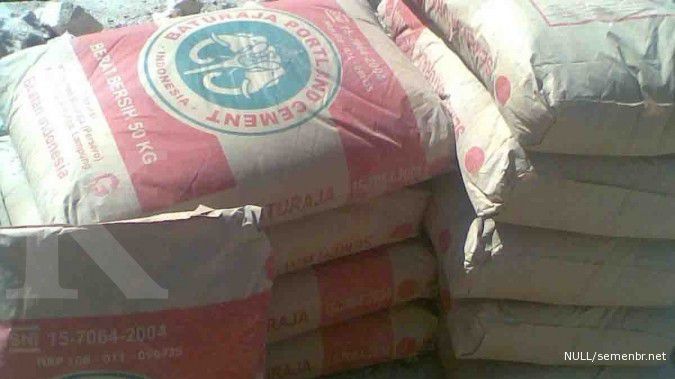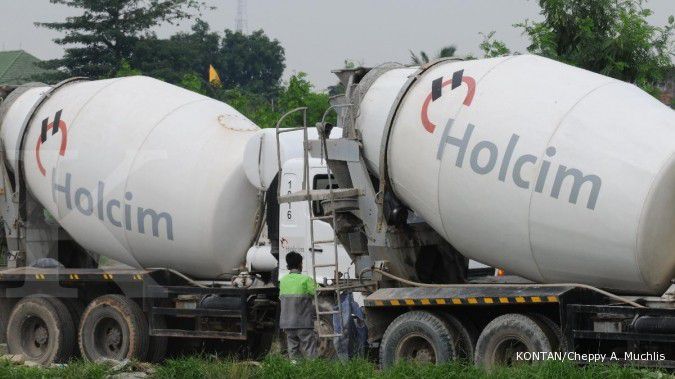JAKARTA. The country’s biggest cement producer, PT Semen Indonesia, is targeting 8 percent sales increase this year and allocating up to Rp 5 trillion (US$429 million) of capital expenditure (capex) to help enhance production capacity.
Semen Indonesia corporate secretary Agung Wiharto said Monday that the company expected its sales volume to grow 8 percent from 27.8 million tons last year.
“We will enhance production at our existing facilities to achieve the target,” he said.
The publicly listed company aims to produce 31.8 million tons of cement, up by 6 percent compared to 30 million tons last year. It has set a long-term target of 40 million tons of cement in 2017.
This year’s additional production is expected to come from the Dumai cement mill, which, when it is operational, is projected to produce 900,000 tons of cement per annum. The company also commenced the operation of Tonasa V facilities in Pangkep, South Sulawesi, last week. The factory produce 3 million tons of cement once fully operational.
Agung said that the company would disburse Rp 4-5 trillion of capex this year. The company will allocate about Rp 3 trillion to finance the construction of new facilities in Padang, West Sumatra, and Rembang, Central Java. The remaining funds will be used to enhance existing production, build two new packing plants and finance operations.
He said that the total investment of the two new facilities would be Rp 7.2 trillion, with the construction of the Padang facility designed to conclude in 2016 while Rembang would be in 2017.
Semen Indonesia currently owns 22 cement mills and 21 packing plants. It also has 11 special ports, one of which is located in Vietnam.
Semen Indonesia, according to a written statement published on Sunday, managed to book Rp 24.5 trillion in revenue last year, which is a 25 percent increase compared to Rp 19.5 trillion recorded in 2012.
Semen Indonesia booked Rp 5.37 trillion in profits in 2013, up by 10.8 percent compared to Rp 4.84 trillion in 2012.
Semen Indonesia managed to secure 44 percent of the country’s cement market in 2013, a significant increase compared to 41 percent in 2012.
The company recorded an increase in its earnings before interest, taxes, depreciation and amortization (EBITDA) of Rp 8.1 trillion last year, increasing by 17.9 percent compared to Rp 6.8 trillion the previous year.
Semen Indonesia president director Dwi Soetjipto said that 2013 was actually a challenging year for the company with the fuel price hike and base electricity prices, which it managed by carrying out operational efficiency.
“The company’s move to build a packing plant in Sorong [West Papua] also helped to reduce packaging costs,” he said in the statement.
Last year, the company trimmed down packaging costs from Rp 33,078 per ton of cement to Rp 29,430 per ton.
Semen Indonesia is currently working with state-owned steel company Krakatau Steel on a joint venture to produce slag powder — a raw material for cement production.
The joint venture company, to be called Krakatau Semen Indonesia (KSI), will build a Rp 440 billion slag powder plant in Ciwandan, Cilegon, Banten.
The construction of the slag powder plant, which will have a production capacity of 750,000 tons per year, will commence early this year, with commercial production expected to begin in 2016. The facility will supply material to produce Portland cement, an ingredient of concrete.
Semen Indonesia eyes 2014 sales rise
February 25, 2014, 04.05 PM
/2011/08/02/660103492.jpg)
ILUSTRASI. Dua produk Mie Sedaap merek Indonesia, yakni mie instan Korean Spicy Soup dan mie instan Korean Spicy Chicken, ditarik dari peredaran di Singapura. KONTAN/Cheppy A. Muchlis
Source: The Jakarta Post
| Editor: Asnil Amri
Latest News
-
March 04, 2026, 05.27 PM
Fitch Cuts Indonesia Credit Rating Outlook to Negative
-
March 03, 2026, 12.18 PM
Indonesia Hopes to Get MSCI Response to Capital Market Reforms Before May
-
March 02, 2026, 04.45 PM
Indonesia has Seized 5 Million Hectares of Palm Oil Plantations, Task Force Says
-
March 02, 2026, 01.10 PM
Asian Assets Slide as Mideast Strikes Spark Oil Spike, Haven Rush
-
March 02, 2026, 10.49 AM
Bank Indonesia Monitoring Market Movements in Response to Conflict in Middle East
-
February 25, 2026, 08.28 PM
Inpex to Solicit Bids for Construction of Indonesia's Abadi LNG Project in Mid-2026
-
February 24, 2026, 03.38 PM
Eni to Reach Final Investment Decision for Indonesia Gas Projects Next Month
-
February 24, 2026, 01.00 PM
Asia Stocks Try to Steady after Wall Street Selloff Sims Mood
-
February 23, 2026, 04.50 PM
Wall Street Futures and Dollar Slide on Trump Tariff Tumult











